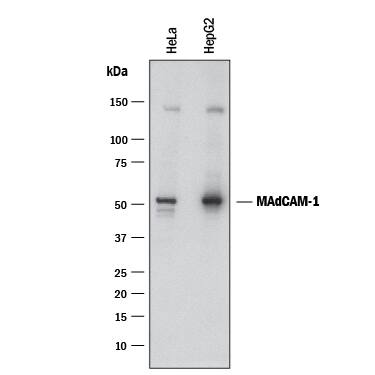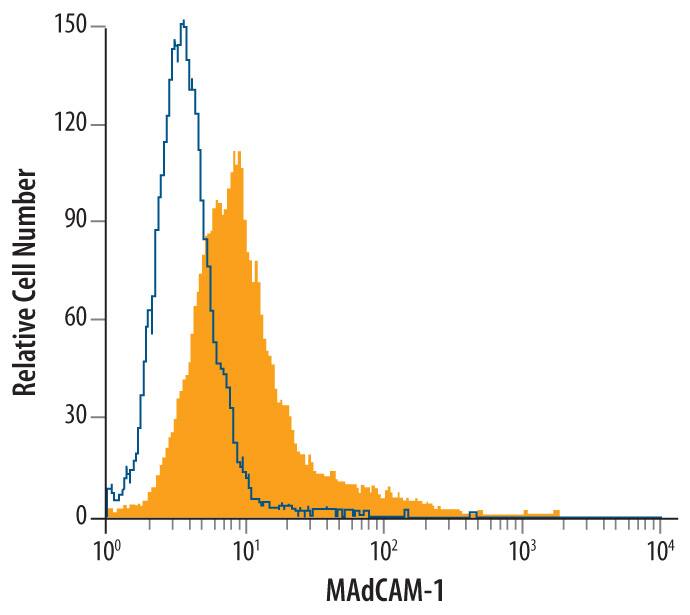Human MAdCAM-1 Antibody
R&D Systems, part of Bio-Techne | Catalog # MAB6056


Conjugate
Catalog #
Key Product Details
Species Reactivity
Human
Applications
CyTOF-ready, Flow Cytometry, Western Blot
Label
Unconjugated
Antibody Source
Monoclonal Mouse IgG1 Clone # 683715
Product Specifications
Immunogen
Mouse myeloma cell line NS0-derived recombinant human MAdCAM-1
Leu21-Gln333
Accession # AAY82472
Leu21-Gln333
Accession # AAY82472
Specificity
Detects human MAdCAM-1 in direct ELISAs.
In direct ELISAs, no cross-reactivity
with recombinant mouse MAdCAM-1, recombinant human (rh) ALCAM, rhBCAM,
rhCEACAM-1, rhEpCAM, rhICAM-1, -2, -3, -4, -5, rhCD31/PECAM-1, or rhVCAM-1 is
observed.
Clonality
Monoclonal
Host
Mouse
Isotype
IgG1
Scientific Data Images for Human MAdCAM-1 Antibody
Detection of Human MAdCAM-1 by Western Blot.
Western blot shows lysates of HeLa human cervical epithelial carcinoma cell line and HepG2 human hepatocellular carcinoma cell line. PVDF membrane was probed with 1 µg/mL of Mouse Anti-Human MAdCAM-1 Monoclonal Antibody (Catalog # MAB6056) followed by HRP-conjugated Anti-Mouse IgG Secondary Antibody (HAF018). A specific band was detected for MAdCAM-1 at approximately 40 kDa (as indicated). This experiment was conducted under reducing conditions and using Western Blot Buffer Group 1.Detection of MAdCAM‑1 in HeLa Human Cell Line by Flow Cytometry
HeLa human cervical epithelial carcinoma cell line was stained with Mouse Anti-Human MAdCAM-1 Monoclonal Antibody (Catalog # MAB6056, filled histogram) or isotype control antibody (Catalog # MAB002, open histogram), followed by Phycoerythrin-conjugated Anti-Mouse IgG Secondary Antibody (Catalog # F0102B).Applications for Human MAdCAM-1 Antibody
Application
Recommended Usage
CyTOF-ready
Ready to be labeled using established conjugation methods. No BSA or other carrier proteins that could interfere with conjugation.
Flow Cytometry
2.5 µg/106 cells
Sample: HeLa human cervical epithelial carcinoma cell line
Sample: HeLa human cervical epithelial carcinoma cell line
Western Blot
1 µg/mL
Sample: HeLa human cervical epithelial carcinoma cell line and HepG2 human hepatocellular carcinoma cell line
Sample: HeLa human cervical epithelial carcinoma cell line and HepG2 human hepatocellular carcinoma cell line
Formulation, Preparation, and Storage
Purification
Protein A or G purified from hybridoma culture supernatant
Reconstitution
Sterile PBS to a final concentration of 0.5 mg/mL. For liquid material, refer to CoA for concentration.
Formulation
Lyophilized from a 0.2 μm filtered solution in PBS with Trehalose. *Small pack size (SP) is supplied either lyophilized or as a 0.2 µm filtered solution in PBS.
Shipping
Lyophilized product is shipped at ambient temperature. Liquid small pack size (-SP) is shipped with polar packs. Upon receipt, store immediately at the temperature recommended below.
Stability & Storage
Use a manual defrost freezer and avoid repeated freeze-thaw cycles.
- 12 months from date of receipt, -20 to -70 °C as supplied.
- 1 month, 2 to 8 °C under sterile conditions after reconstitution.
- 6 months, -20 to -70 °C under sterile conditions after reconstitution.
Background: MAdCAM-1
References
- Ando, T. et al. (2007) BMC Physiol. 7:10.
- Dando, J. et al. (2002) Acta Crystallogr. D 58:233.
- Leung, E. et al. (1996) Immunol. Cell Biol. 74:490.
- Ambruzova, Z. et al. (2009) Hum. Immunol. 70:457.
- Tada, T. et al. (2008) Exp. Anim. 57:247.
- Volpes, R. et al. (1992) Hepatology 15:269.
- Connor, E.M. et al. (1999) J. Leukoc. Biol. 65:349.
- Ala, A. et al. (2001) Gut 49:3043.
- Yang, X.D. et al. (1997) Diabetes 46:1542.
Long Name
Mucosal Addressin Cell Adhesion Molecule 1
Alternate Names
MAdCAM1
Gene Symbol
MADCAM1
UniProt
Additional MAdCAM-1 Products
Product Documents for Human MAdCAM-1 Antibody
Product Specific Notices for Human MAdCAM-1 Antibody
For research use only
